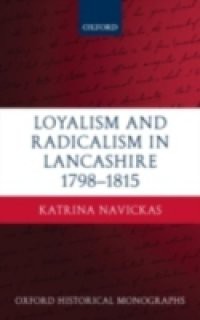Loyalism and Radicalism in Lancashire, 1798-1815 is a lively and detailed account of popular politics in Lancashire during the later years of the French Revolution and during the Napoleonic wars. Drawing on a wide variety of sources, such as letters, diaries, and broadside ballads, it offers fresh insights into the complicated dynamics between radicalism, loyalism, and patriotism, and emphasises Lancashire's distinctive political culture and its place at theheart of the industrial revolution. This region witnessed some of the most intense, disruptive, and violent popular politics in this period and beyond. Highly active and vocal groups emerged - extreme republicans, more moderate radicals, Luddites, early trade unionists, and also strong networks of 'Church-and-King' loyalists and Orange lodges. Katrina Navickas explains how this heady mix created a politically charged region where both local and national affairs played their part. She follows the inner workings of popular political activity in response to both internal and external threats, including loyalist processions and civic events, volunteer corps formed as defence against invasion, food riots, strikes by trade unions, and both secret and public meetings on the key issues of peace and parliamentary reform. Navickas argues fora distinct sense of regional identity that shaped not only local politics but also patriotism. Lancastrians felt British in the face of the French, but it was a particularly Lancastrian type of Britishness.

